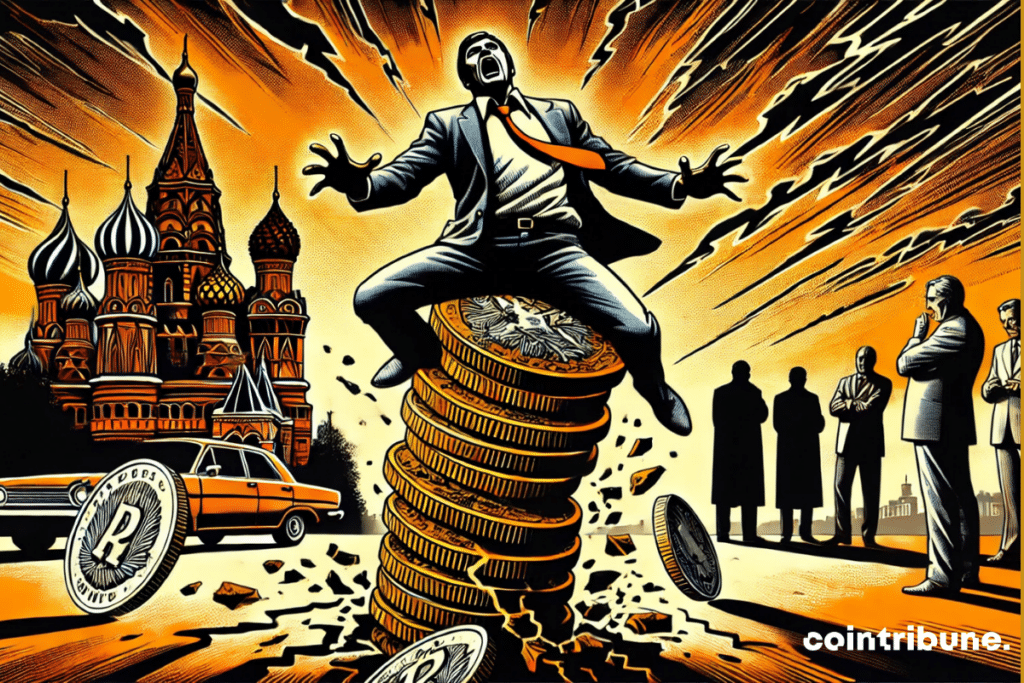Structural Weaknesses Threaten Russia’s Economic Stability
The Russian economy is faltering under the weight of its own structural flaws and an increasingly hostile international environment. While the Kremlin attempts to showcase resilience in the face of Western sanctions and geopolitical tensions, the latest reports from the Bank of Russia and the Ministry of Economy paint a much more concerning reality. Between collapsing oil revenues, an exploding budget deficit, and a private sector on the brink of suffocation, Russia faces major economic challenges that could profoundly affect its medium-term stability.

A worsening budget deficit and public finances under pressure
The Russian economic model, heavily reliant on energy exports, is confronted with an unyielding reality: the drop in oil prices jeopardizes the state’s revenues. According to the Bank of Russia, a continued decline in prices could seriously jeopardize the country’s budgetary balance. “Energy-related revenues, directly dependent on the level of crude oil prices, account for about a third of the Russian state’s tax revenues,” highlight analysts from the Ministry of Economy. This pressure on public finances is reflected in an explosion of the budget deficit, which reached 1.7 trillion rubles (18 billion euros) as early as January.
To finance this shortfall, Moscow is critically tapping into its sovereign fund, intended to be a strategic lever to ensure the country’s stability during times of crisis. The fund has decreased from $112.7 billion in 2022 to only $37.5 billion today. The central bank warns that “this fund is not intended to cover prolonged periods of budget deficit.” This thus highlights the unsustainable nature of this strategy. While the Kremlin touts the strength of the national economy, the figures reveal a much more fragile reality, where the country’s financial resources are dangerously dwindling.
A strangled private sector and hampered growth prospects
If the state struggles to maintain its budgetary balance, Russian companies are also facing increasing difficulties. Interest rates at 21 % weigh heavily on private sector investment capacities, making access to credit almost impossible for many businesses. “An investment deficit today is a growth deficit in two to three years,” warns the Ministry of Economy, which informs us of the disastrous impact of this situation on the country’s future.
Beyond this financing hurdle, costs are exploding for companies, under the effect of several combined factors: labor shortages due to the war in Ukraine, rising customs tariffs, and increased taxes and interest charges. According to the Ministry of Economy, these additional costs will reach 14.8 trillion rubles during this year 2025, equivalent to 45 % of the total volume of private investments in tangible fixed assets from 2024. A scenario that stifles companies and drastically limits their maneuverability, especially as domestic and international demand is declining, reducing their ability to set competitive prices.
While Vladimir Putin and his senior officials publicly insist on the country’s resilience in the face of Western sanctions, economic realities tell a completely different story. Behind the scenes, the Kremlin is concerned about the perverse effects of the war in Ukraine on the national economy: amid labor shortages, the devaluation of the ruble, and the skyrocketing funding costs, growth prospects are dwindling.
Could Russia face an even deeper economic crisis? If the situation continues to deteriorate, the government may be forced to make radical choices: reduce its public spending, raise taxes again, or find new sources of funding abroad, a significant challenge in the current context.
Maximize your Cointribune experience with our "Read to Earn" program! For every article you read, earn points and access exclusive rewards. Sign up now and start earning benefits.
Diplômé de Sciences Po Toulouse et titulaire d'une certification consultant blockchain délivrée par Alyra, j'ai rejoint l'aventure Cointribune en 2019. Convaincu du potentiel de la blockchain pour transformer de nombreux secteurs de l'économie, j'ai pris l'engagement de sensibiliser et d'informer le grand public sur cet écosystème en constante évolution. Mon objectif est de permettre à chacun de mieux comprendre la blockchain et de saisir les opportunités qu'elle offre. Je m'efforce chaque jour de fournir une analyse objective de l'actualité, de décrypter les tendances du marché, de relayer les dernières innovations technologiques et de mettre en perspective les enjeux économiques et sociétaux de cette révolution en marche.
The views, thoughts, and opinions expressed in this article belong solely to the author, and should not be taken as investment advice. Do your own research before taking any investment decisions.